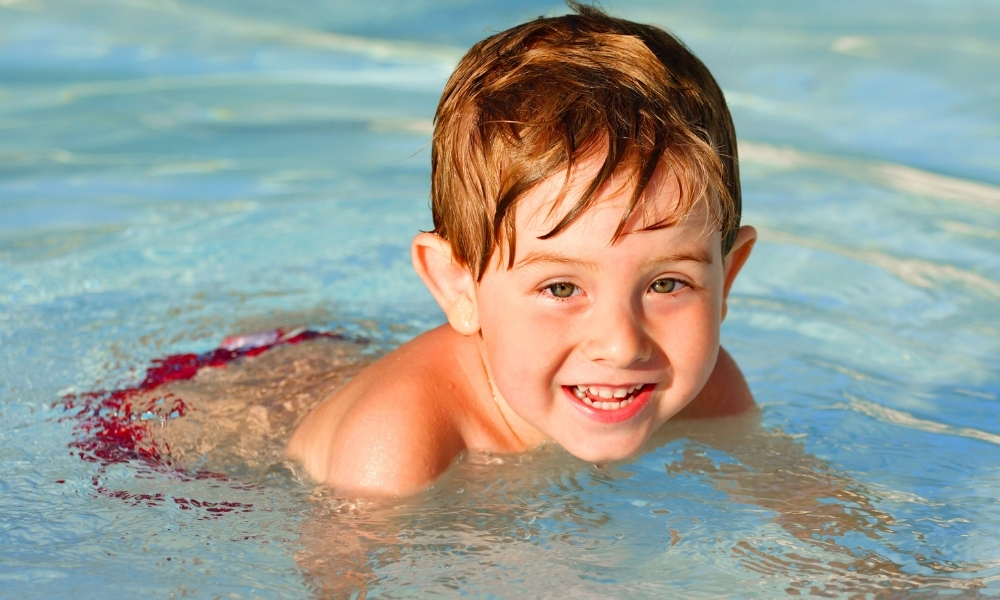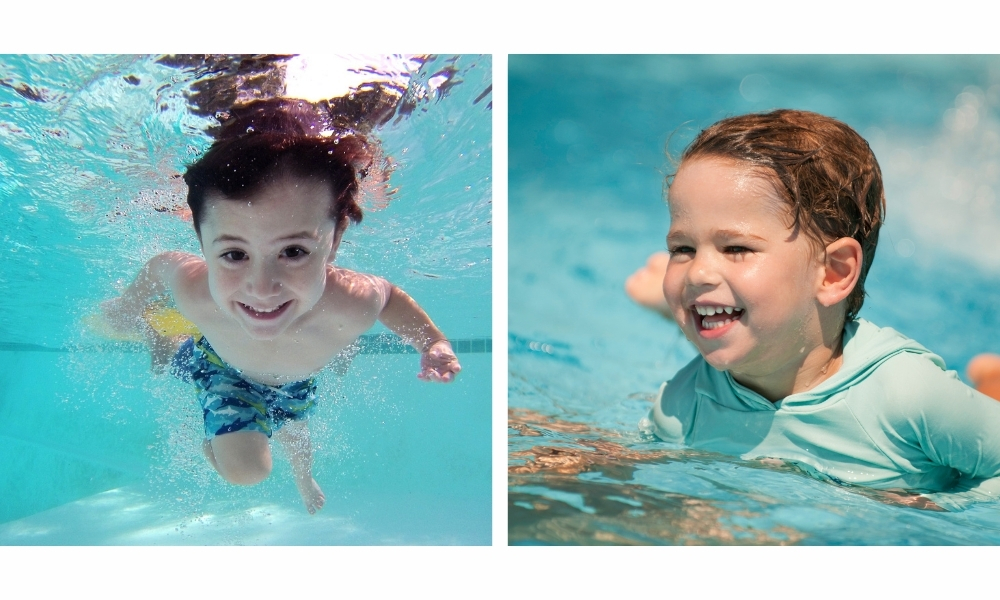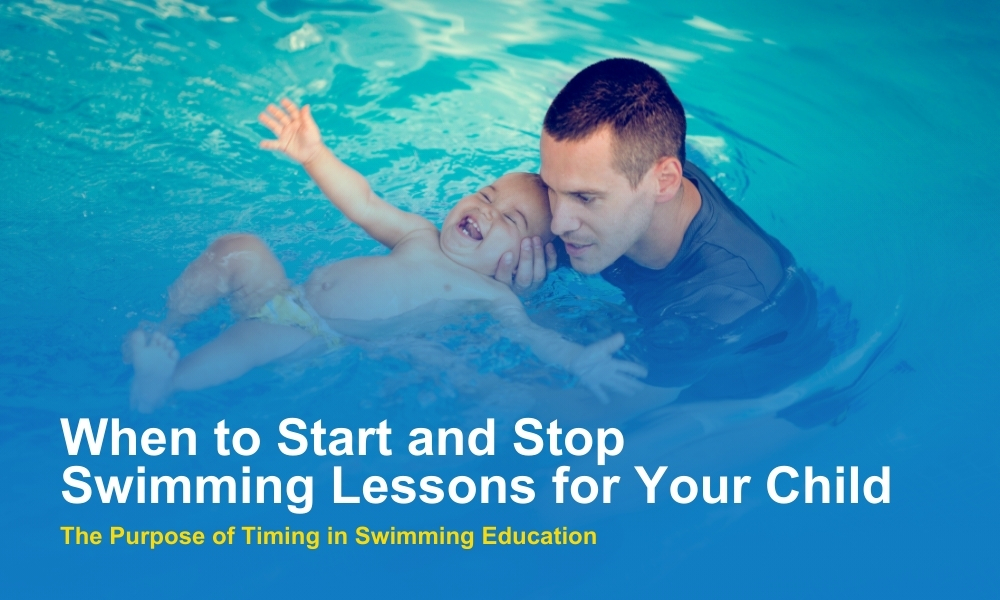Every parent wants their child to be safe and comfortable in the water and swimming lessons will help. However, navigating the ideal starting point and knowing when to start and stop swimming lessons can be confusing. This guide will help you make an informed decision by looking at the following:
- The essential nature of timing.
- Insight into the best age to start swim lessons.
- The benefits of early exposure.
- Identifying skills required before taking a break from formal swimming lessons.
Benefits of Starting Swim Lessons Early
- Water Confidence: Early exposure gives your little one a sense of comfort and familiarity with water. Early water familiarisation builds confidence, reducing apprehension around large bodies of water.
- Safety Skills: Basic skills like submerging, kicking, and floating can be introduced, building a foundation for water safety awareness.
- Physical Development: Swimming is great for young children’s muscle development, coordination, and balance.
The Purpose of Timing in Swimming Education

The right timing for swimming lessons can significantly impact your child’s confidence and skill development. Starting too early might lead to frustration, and delaying lessons can leave them vulnerable around water.
There are three main stages to consider:
- Introducing babies to water
- Introducing toddlers to water
- Progressing through formal swim programs and when you can consider pausing formal swim classes
When to Start Swimming Lessons for Babies
At Shapland’s, we start programs for babies as young as five months old. There are undeniable benefits to introducing babies to water early and go beyond water familiarisation. Here’s why:
- Using Natural In-built skills: Building on key skills for safety such as a babies natural in-built skills (e.g. floating) that allow them to learn how to float face up.
- Building Water Confidence and Essential Swim Skills: Early exposure to the swimming pool allows children to develop a positive relationship with water.
- The Role of Consistent Practice and a Nurturing Environment: Repetition and nurturing teachers are key for skill development.
- Parent-and-child bonding: When parents actively participate, their children develop a positive association with water
At five months old, babies know how to regulate their body temperature for short periods, which makes it the ideal time for gentle water familiarisation classes.
When to Start Swimming Lessons for Toddlers
If your toddler wasn’t introduced to the pool as a baby, this is the next best age to start. The benefits are many and here’s why:
- Building Water Confidence: Early exposure to the swimming pool allows children to develop a positive relationship with water.
- Basic water safety skills: Toddlers learn essential skills like entering and exiting the pool safely, basic breath control, and floating on their backs.
- Improved motor skills: Swimming uses various muscle groups, promoting development of gross motor skills like kicking and paddling, and fine motor skills for balance and coordination.
- Social Development: Provides opportunities to interact with peers and instructors, building confidence and social skills.
What skills does your child need to know before finishing formal swim lessons?

Knowing when to stop swim lessons, it’s crucial your little ones possess essential water safety skills. Every child should be able to do the following:
Water Safety and Confidence
- Comfortably enter and exit the water independently: This reduces dependence on others and allows for safe exploration of various water environments (pools, beaches, etc.).
- Put their face underwater for short periods: Builds confidence and familiarity with submersion, helpful in unexpected situations.
- Float on their back for an extended period: A crucial survival skill for resting and staying afloat while waiting for help.
- Swim to the side of a pool or ledge: Provides the ability to move away from danger and reach a safe area.
- Be able to get in and out of different bodies of water independently: Ensures safe entry and exit regardless of the environment (beach, pool with ladder, etc.)
Swimming Skills
- Swim skills – be able to easily swim the core swim strokes (front crawl, backstroke, and breaststroke): Provides a variety of swimming techniques to adapt to different water situations and builds overall confidence.
Endurance
- Endurance – swim a continuous distance without goggles: Improves stamina and increases the likelihood of reaching safety in most still water situations.
The time it takes to develop these skills varies depending on the child’s age, aptitude, and lesson consistency. For example, some children take longer than others to put their face underwater, so they may progress differently.
Be patient and encourage your child at the level they are at. It is essential that your little one progresses at a natural pace and your childs instructor will be able to update you on their progress.
Advancing Through Swim Programs
Shapland Swim Schools offer a structured program that transitions seamlessly from baby and toddler classes to more advanced skill development.
Transitioning from Baby to Toddler Swim Programs
As your child progresses, they can move from the nurturing environment of the baby program to a toddler program focused on building upon existing skills. Look for indicators like comfort in deeper water, independent kicking, and attempts at rudimentary arm movements.
With a gradual depth increase, Shapland’s bespoke pool design is a safe space for toddlers to gain confidence while progressing. Our teachers will guide you when it’s time for your baby to progress to toddler classes.
The Journey Through Toddler Swim Programs
Toddler programs are for ages 2-3 and focus on developing core skills like holding their breath under the water, floating, moving in water, breathing and more.
We don’t just teach your little ones how to swim. We introduce water safety skills in fun ways, like jumping in and grabbing toys from the bottom of the pool. Encouragement and cheers are key here, keeping your child excited about the water and all the splashy fun that comes with it.
Advanced Classes and Swimming as a Recreational Sport
Our advanced classes are for children who have mastered basic skills and are ready for a challenge. These classes aren’t just about swimming in a straight line. Kids will learn proper techniques to move through the water, refine strokes and prepare children for competitive swimming if they choose to pursue it.
Swim lessons or not, swimming is a skill for life that keeps on giving! Here’s why getting your little one in the water early is a win-win:
- Builds confidence around water and sets them up to be safe.
- Formal swim programs equip children with essential water safety skills and swimming competency.
- Like Shapland’s, a structured program offers a smooth transition through various stages, ensuring a positive and enriching learning experience for your child.
Building Confidence in the Water: Why Early Swim Lessons Matter
Shapland Swim Schools understand the significance of timing in your child’s swimming education. Watch your little one blossom into a water lover at our nurturing swim school!
See your babies and toddlers build lasting confidence in and around water in a playful and safe environment. Find your nearest location and start your child on their amazing aquatic adventure!

